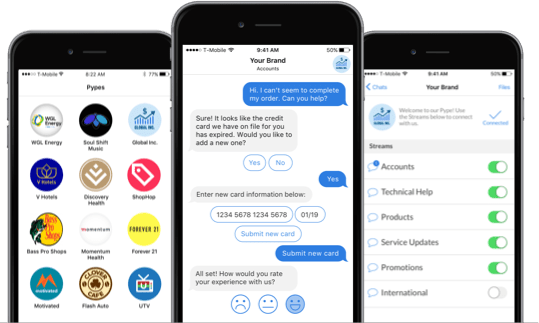Conversational artificial intelligence (AI) is all the rage. Case in point? In a recent survey, 15 percent of U.S. adults said they’d used a chatbot to interact with a company this year. Be that as it may, such systems can be difficult to design and maintain if you don’t have the data science chops. And with the demand for AI experts expected to soar 28 percent by 2020, according to IBM, finding the necessary talent is not going to get any easier.
But firms like Pypestream are working to close the gap. In a few short years, the New York-based AI solutions startup has signed on customers like Shell, DishNetwork’s Sling TV, and TriWest. And Pypestream says it has tripled its customer base in the past 12 months alone. To fuel that growth, it today announced a $15 million raise led by insurance company W.R. Berkley, bringing its total haul to $35 million.
This round follows on the heels of $15 million in Series A financing last year. And it coincides with the launch of Design Studio, a new customization tool that sits atop Pypestream‘s proprietary natural language processing (NLP) engine.
“The automated, on-demand experiences our clients now deliver to their customers through messaging far exceed those of interacting with live agents or web chat — they’re fast, highly functional, intuitive, and economically efficient,” CEO Richard Smullen said. “We will use this additional capital to help more businesses provide … experiences that their customers not only love but expect.”
June 5th: The AI Audit in NYC
Join us next week in NYC to engage with top executive leaders, delving into strategies for auditing AI models to ensure fairness, optimal performance, and ethical compliance across diverse organizations. Secure your attendance for this exclusive invite-only event.

Above: Pypestream’s suite, from a user perspective.
Design Studio, which is now generally available, allows enterprise customers to create chatbots with authentication, API integrations, list pickers, carousels, GIFs, and more. It’s powered by Pypestream’s aforementioned NLP backend and features single sign-on, allowing multiple employees to collaborate on the design.
Michael Nannizzi, director of investments at W.R. Berkley and a member of Pypestream’s board of directors, said the solution is being actively used by W.R. Berkley across its businesses.
“I was impressed by Pypestream’s ability to upgrade the customer experience,” he said. “[The] technology is helping companies improve their engagement and achieve important efficiencies through the use of its powerful conversational interface.”
Design Studio is a far cry from Pypestream’s minimum viable product (MVP): a siloed app through which its business clients communicate with their customers. It eventually blossomed into the Pypestream Conversational Interface, an omnichannel, Erlang-based offering that’s end-to-end encrypted, plays nicely with first- and third-party apps, and supports things like claim submission, payments processing, file sending, and appointment scheduling.
Pypestream’s AI system handles the bulk of incoming message requests. It’s trained on a per-customer basis to understand intent — that is, what a given user wants — and entities, or target objects. For example, in the request “What is the current payment due on my internet account,” payment due is the intent (to check a balance) and internet account is the entity.
It’s all managed from Pype Manager, Pypestream’s live agent dashboard. In addition to built-in analytics and reporting tools, it boasts automated conversation routing that enables handoffs to human agents with specialized skill sets, and agent-to-agent transfer. Also in tow is integration with Salesforce Service Cloud and third-party live agent vendors that use REST APIs.
“Pypestream, which was founded in 2015, has more than 50 employees and is headquartered in New York City.”


